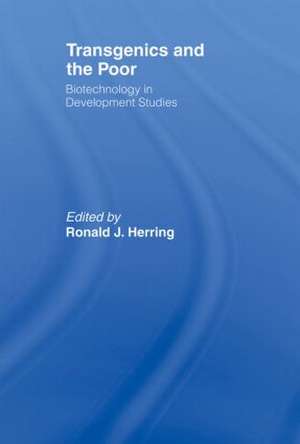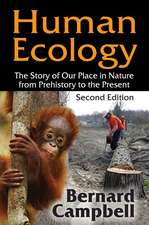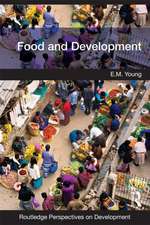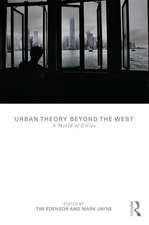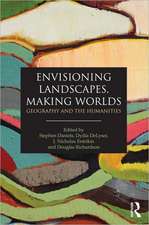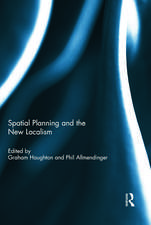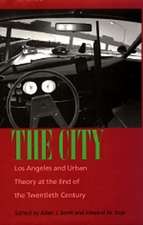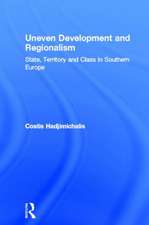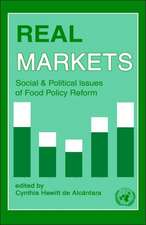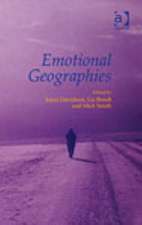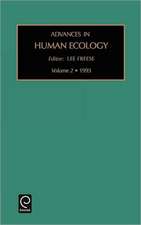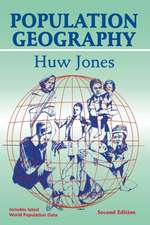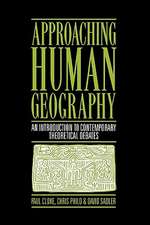Transgenics and the Poor: Biotechnology in Development Studies
Editat de Ronald J. Herringen Limba Engleză Paperback – 27 dec 2007
This book begins with the needs of the poor - for income, nutrition, environmental integrity - and evaluates the theory and evidence for contributions from transgenic crops. Social scientists with expertise in regional studies, economics, sociology, agriculture and political science join biologists to bring specialized knowledge on genuinely new questions created by the genomics revolution; questions of:
- ecological integrity
- biodiversity
- international trade
- the costs and effectiveness of biosafety protocols.
In this much-needed book, an emergent empirical literature allows scholars in disciplines ranging from micro-biology to economics and political science to assess the potential effects of transgenic organisms on poverty through multiple dynamics of property, yields, prices, biodiversity, environmental integrity and nutrition.
The Journal of Development Studies awards an annual prize in memory of the late Dudley Seers, for the best article to appear in each volume of the Journal. Transgenics and the Poor:Biotechnology in Development Studies” has been adjudged to be the winner of the Dudley Seers Memorial Prize for Volume 43.
| Toate formatele și edițiile | Preț | Express |
|---|---|---|
| Paperback (1) | 416.05 lei 6-8 săpt. | |
| Taylor & Francis – 27 dec 2007 | 416.05 lei 6-8 săpt. | |
| Hardback (1) | 1006.07 lei 6-8 săpt. | |
| Taylor & Francis – 31 mai 2007 | 1006.07 lei 6-8 săpt. |
Preț: 416.05 lei
Nou
Puncte Express: 624
Preț estimativ în valută:
79.61€ • 83.42$ • 65.81£
79.61€ • 83.42$ • 65.81£
Carte tipărită la comandă
Livrare economică 11-25 aprilie
Preluare comenzi: 021 569.72.76
Specificații
ISBN-13: 9780415468763
ISBN-10: 0415468760
Pagini: 248
Dimensiuni: 156 x 234 x 15 mm
Greutate: 0.45 kg
Ediția:1
Editura: Taylor & Francis
Colecția Routledge
Locul publicării:Oxford, United Kingdom
ISBN-10: 0415468760
Pagini: 248
Dimensiuni: 156 x 234 x 15 mm
Greutate: 0.45 kg
Ediția:1
Editura: Taylor & Francis
Colecția Routledge
Locul publicării:Oxford, United Kingdom
Public țintă
UndergraduateCuprins
1. The Genomics Revolution and Development Studies 2. Plant Breeding and Poverty From GR to GM 3. The Impact of Agricultural Biotechnology on Yields, Risks and Biodiversity in Developing Countries 4. The Potential of Genetically Modified Food Crops to Improve Human Nutrition and Health in Developing Countries 5. Considerations on the Use of Transgenic Crops for Insect Control 6. Transgenic Crops 7. Stealth Seeds 8. Loose Seeds, Official Seeds, and Risk 9. Identity Preservation, Market Effects and Developing Countries 10. Agroecological Alternatives 11. Supplying Crop Biotechnology to the Poor
Notă biografică
Ronald Herring is Professor of Political Economy in the Department of Government at Cornell University, where he has been Director of the Mario Einaudi Center for International Studies, the John S. Knight Professor of International Relations, Chair of the Department of Government and Acting Director of Cornell’s South Asia Program. Before Cornell, he was Professor of political science at Northwestern University and taught briefly at the Universities of Chicago, Texas, Washington, and Wisconsin. Herring has been Editor of Comparative Political Studies, and remains on its editorial board, as on the boards of Contemporary South Asia, Critical Asian Studies, Journal of Development Studies and India Review. His earliest academic interests were with land relations; Land to the Tiller: The Political Economy of Agrarian Reform in South Asia (Yale University Press/Oxford University Press) won the Edgar Graham Prize (London l986). He has recently explored connections between economic development and ethnicity -- Carrots, Sticks and Ethnic Conflict: Rethinking Development Assistance (University of Michigan Press, edited with Milton Esman). Herring is currently Director/Convener of the Program on Development, Governance and Nature at Cornell University.
Descriere
In this much-needed book, an emergent empirical literature allows scholars in disciplines ranging from micro-biology to economics to assess the potential effects of transgenic organisms on poverty.
